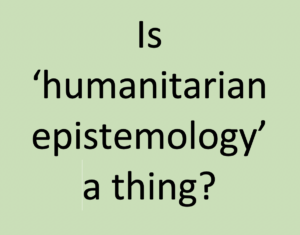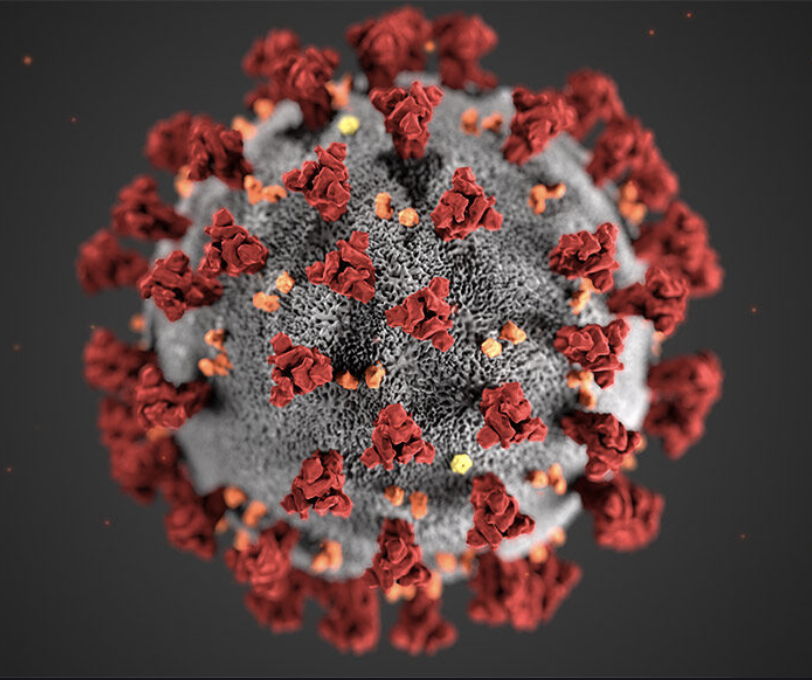“We must make public health decisions based on science, on fact.”
-humanitarian worker with a major INGO
To know the world as a humanitarian
Some general thoughts on epistemology
“How do you know that?” is one of the most common questions we ask each other. Stated in its simplest terms epistemology is the study of how we know what we know and how we know we know what we know.
Recently I was fortunate enough to get my second Covid-19 vaccine shot; I am now fully vaccinated. When someone asks me how I know that the vaccine works they are asking essentially an epistemological question. My answer is that I know based on the science behind the vaccine and the testing that was done in numerous and ongoing studies to amplify, clarify, and extend the information we have on the efficacy of the vaccine.
extend the information we have on the efficacy of the vaccine.
That is to say, I am using science as my epistemological foundation. Science gathers information systematically, objectively, and thoroughly. Science is also open to changing conclusions based on new results and new information. Facts remain ‘true’ unless or until they are contradicted by new scientifically gathered data. Scientific knowledge in this sense is not necessarily static, but rather but rather a dynamic and flexible way of knowing the world.
Some scientific facts have stood the test of time. For example we do not disagree on the basic chemical elements and their composition in terms of electrons and protons. These are established facts that transcend history, ideology, culture, or nationality. Other scientific facts, particularly those based on human populations, can be more slippery to pin down and demand ongoing investigation, questioning, and revision concerning what is considered fact.
When you get into social scientific information the problem of fact is even more slippery. Human society is both reflexive and nonlinear as a system; it changes very rapidly and often unpredictably.
Another one way of knowing is faith. Faith simply asks you to take truth as it is given by some external source or higher power, be that a god or a news channel, and take that as reality. The contrast between science and faith as epistemologies could not be more stark. One is flexible, rigorous, objective, thorough, and ongoing, and the other one is dogmatic, relatively inflexible, and demonstratively not grounded in empirical fact.
As we have conversations with our friends, neighbors, colleagues, and associates it is incumbent upon us to consider the epistemological foundation of the ‘facts’ they cite. The epistemological source makes a difference. This is especially true when talking about public health concerns. I took the vaccine and continue to practice social distancing and mask wearing because the science behind these protocols is sound.
Discussion with a humanitarian worker
RecentlyI had the pleasure of talking with a colleague and friend from Bangladesh. We first talked about general matters of our families etc. but then turned to the Covid pandemic and how the number of positive cases are rising rapidly in Bangladesh.
This global pandemic is influencing the entire world, but unevenly so. Many nations are having difficulty gaining access to the vaccine, and the distribution of shots is incomplete, difficult, and sometimes politically contentious.
We talked about a couple matters, including the fact that one of the biggest hurdles in this pandemic is the information -or lack thereof- that is being passed on from the public health sector to the population. On example is when and to what degree one is protected from the virus after being vaccinated. There are some people who believe  that immediately after getting the vaccine they are fully protected, which is demonstratively and scientifically not the case. There are many stories in the press both in the US and in Bangladesh about people dying after getting vaccinated, and these stories cause concern because they may be true but ignore the fact the vaccine is not fully effective until two weeks post second shot and, in any case are not 100% effective. These stories create the public perception that the vaccine does not work, but the fact is that protocol was not followed and the individual was not fully protected after one or two days post first shot.
that immediately after getting the vaccine they are fully protected, which is demonstratively and scientifically not the case. There are many stories in the press both in the US and in Bangladesh about people dying after getting vaccinated, and these stories cause concern because they may be true but ignore the fact the vaccine is not fully effective until two weeks post second shot and, in any case are not 100% effective. These stories create the public perception that the vaccine does not work, but the fact is that protocol was not followed and the individual was not fully protected after one or two days post first shot.
Another topic we talked about was the matter of faith. After my friend was vaccinated a neighbor questioned his wife about his faith. She asked if he really had faith he did not need a vaccination because God would protect him. He explained me that his interpretation of the Koran was such that Allah would protect, but first humans need to to protect themselves. That is to say there were different interpretations of religion, one of which matched with the scientific protocols and the other one demonstratively did not. Religion, when interpreted in such a way as it complements of scientific knowledge, can be a very powerful tool in helping to control the Covid pandemic. But when religion is interpreted in such a way as it contradicts science this is a major problem and public health issue.
We talked about how the situations were very similar between the United States and Bangladesh, and that in both countries there were those perpetuating information not based on science and hence harming the effort to save lives through good protocols and good vaccination acceptance. We need to live in a world where the epistemological bases upon which people make their decisions is sound, grounded in fact, and introduces truths that we can all live with.
Making sure that your humanitarian response is relevant includes understanding how those you work with and for know the world in which they live and act, most definitely so the affected populations. At times creating bridges between faith based and scientific ways of knowing is the most important work that can be accomplished.


 Follow
Follow